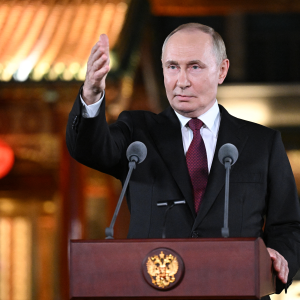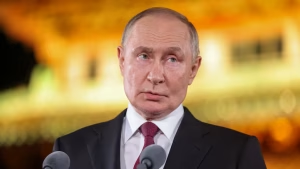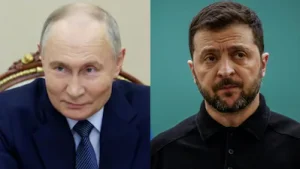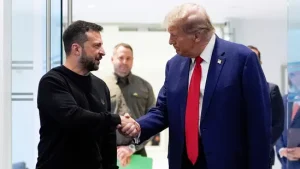Moscow, Russia – Russian President Vladimir Putin has made significant statements regarding the ongoing Ukraine crisis, expressing openness to meeting with Ukrainian President Volodymyr Zelensky while outlining conditions for resolving the conflict. Putin On Ukraine Russia Conflict has taken a potentially pivotal turn as the Russian leader emphasizes the need for “common sense” to prevail in ending the military confrontation.
The Russian president’s comments come amid continued fighting with no formal peace negotiations currently underway, raising important questions about Moscow’s genuine intentions and commitment to diplomatic solutions.
Putin’s Conditional Meeting Proposal

Putin explicitly stated he has never dismissed the possibility of engaging directly with Zelensky, though he questioned the potential effectiveness of such discussions. “I’ve never ruled out meeting Zelensky,” the Russian leader asserted, while adding significant caveats about the meaningful nature of potential talks.
The Russian president’s position on Putin On Ukraine Russia Conflict centers on his assessment of Ukraine’s current political and constitutional framework. Putin argued that Ukraine faces constraints due to what he termed an “illegitimate leader,” constitutional requirements for referendums, and martial law provisions that could potentially be extended indefinitely.
Political Resolution Through Pragmatic Approach

Putin emphasized that the conflict could find resolution through political means if both Kyiv and Western nations adopted what he characterized as a pragmatic approach to the situation. His stark ultimatum regarding Putin On Ukraine Russia Conflict was clear: “The Ukraine conflict can end if common sense prevails. If not, we will have to accomplish our goals through military means.”
This statement underscores Moscow’s continued commitment to achieving its objectives, whether through diplomatic channels or continued military action. The Russian leader’s framing suggests he views the current impasse as resulting from unreasonable positions taken by Ukraine and its Western allies.
Russia’s Stated War Objectives


Putin provided his perspective on Russia’s fundamental motivations for the military operation, explicitly rejecting territorial acquisition as the primary goal. Instead, he framed Putin On Ukraine Russia Conflict in terms of protecting cultural and linguistic rights in disputed regions.
Also Read: Devastating Lisbon Cable Car Crash Kills 15 on Historic Gloria Funicular
“We’re not fighting for territories, we’re fighting for people’s rights- to speak their language, to practice their culture,” Putin declared. He further emphasized that if populations in contested areas chose democratically to join Russia, such decisions must be respected by the international community.
This justification aligns with Moscow’s long-standing narrative about protecting Russian-speaking populations and cultural identity in territories that have become flashpoints in the broader conflict.
NATO Membership Concerns


The Russian president reiterated Moscow’s fundamental opposition to Ukraine’s potential NATO membership, characterizing such expansion as a direct threat to Russian security interests. Putin On Ukraine Russia Conflict cannot be separated from these broader security considerations, according to the Russian leader’s perspective.
“Every country has the right to ensure its security but not at the expense of another,” Putin stated, encapsulating Russia’s position on the NATO expansion issue. This concern has been a consistent element in Moscow’s justification for its actions since the conflict began.
Interestingly, Putin drew a distinction between military and economic alignment, stating that Russia never opposed Ukraine’s economic choices, including potential European Union membership. “Russia always opposed Ukraine joining NATO, but never doubted Kiev’s right to engage in its economic activities however it likes- including EU membership,” he explained.
International Response and Context
Putin’s statements on Putin On Ukraine Russia Conflict come against the backdrop of continued international pressure and diplomatic efforts to resolve the crisis. The timing of these comments appears strategically calculated, as various international actors continue seeking pathways to de-escalation.
The Russian leader’s emphasis on “common sense” suggests Moscow believes current international approaches lack pragmatic thinking necessary for conflict resolution. This positioning allows Putin to present Russia as reasonable while characterizing opposing positions as unrealistic or ideologically driven.
Trump Administration’s Stance

US President Donald Trump expressed disappointment with Putin’s approach to the conflict, indicating his administration was preparing measures to help reduce casualties in the ongoing war. Trump’s comments about Putin On Ukraine Russia Conflict reflected frustration with the Russian leader’s approach: “I am very disappointed in President Putin, I can say that, and we will be doing something to help people live.”
This response suggests continued tensions between Washington and Moscow regarding conflict resolution approaches, despite previous diplomatic engagement attempts.
Path Forward Remains Uncertain
Putin’s latest statements on Putin On Ukraine Russia Conflict present both opportunities and challenges for diplomatic progress. While his expressed willingness to meet Zelensky represents a potential opening, his conditions and ultimatums suggest significant obstacles remain.
The emphasis on Putin On Ukraine Russia Conflict requiring “common sense” approaches indicates Moscow’s expectation that Ukraine and Western partners must make substantial concessions. Whether such expectations align with realistic diplomatic possibilities remains uncertain as the conflict continues with no clear resolution timeline established.

